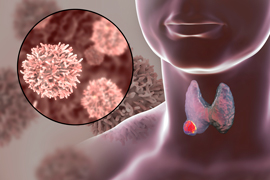Thyroid Cancer Research Study

Doctors at the National Institutes of Health seek patients with thyroid cancer that spread outside the thyroid – to the lymph nodes, lungs or bones. The standard treatment in such situation is therapy with radioactive iodine (RAI). In this study, doctors will assess a new imaging tool - 124I PET/CT, which enables evaluation of how much iodine goes into the tumor. The study goal is to compare how much iodine goes into cancer cells after two different methods of stimulation of RAI uptake:
- A shot of a recombinant human thyroid stimulating hormone (TSH) called Thyrogen
- Stimulation with your own TSH, which is achieved by stopping thyroid hormone medication for 4 weeks.
The imaging will be followed by therapy with RAI dose individualized to each patient, based on the tumor uptake measured by 124I PET/CT.
Who Can Participate?
- 18 or older who have thyroid cancer that has spread outside the thyroid
Participation Includes:
- Two admissions to the NIH Clinical Center, about four weeks apart
- A low iodine diet for two weeks before each admission, to make cancer cells "hungry" for iodine
- Therapy with radioactive iodine, if indicated, and evaluation of response to treatment at least yearly for the next five years
Study-related procedures and medications are provided at no cost.
Location: The NIH Clinical Center, America's Research Hospital is located in Bethesda, MD, on the Metro red line (Medical Center ).
For more information, contact:
NIH Clinical Center Office of Patient Recruitment
1-800-411-1222 (refer to study # 19-DK-0050)
(TTY users dial 7-1-1)
Se habla español
Email: ccopr@nih.gov
Or go online:
https://go.usa.gov/xy5cx
Department of Health and Human Services
National Institutes of Health Clinical Center
National Institute of Diabetes and Digestive and Kidney Diseases
